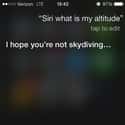-
(#1) Webcam Hacking
Anyone creepy enough and at least somewhat technologically minded could remotely turn on your laptop’s webcam, giving him or her the ability to record you doing whatever you’re doing. A Remote Administration Tool (RAT) can be introduced on a computer through a phishing email or malware, giving a hacker the ability to move items around on your desktop, close what you’re working on, or open your DVD drive.
It also gives creeps the ability to watch women working at their computers through their webcams, which they won’t realize are on. RAT-ers conspire to find “slaves” they can hack into, determine which laptops don’t have lights to indicate their webcams are on, and generally say and do creepy stuff. Makes you want to turn your computer off and live in the woods. -
(#2) Utah Data Center
A gigantic data storage center designed to track everything you do in cyberspace, located in the middle of nowhere with a creepy name and an officially classified mission? Sounds like the stuff of conspiracy theorist nightmares – but it’s a real place. Officially named the Intelligence Community Comprehensive National Cybersecurity Initiative Data Center, but better-known as the Utah Data Center, this million square foot complex cost over $2 billion to build, and can store as much as 12 billion gigabytes of information.
What information does it store? If you believe the Edward Snowden disclosures, everything you do on the Internet and a log of every call you make or receive. Reactions to the sheer size, scope, and creepiness of the Utah Data Center have included protestors flying drones over it and Utah lawmakers proposing bills to cut off its water supply – all activities that are no doubt being logged and stored in the Utah Data Center.
-
(#3) The TV That Listens to You
February 2015 brought a chilling revelation from Samsung – that their new, Internet-enabled televisions come with a voice activated system. But in order to get it to work, the TV has to hear whatever you say – and that the information can be recorded and downloaded to a third-party server. This innovation brought to mind the telescreens from 1984, where government officials could watch and listen to the proles, ensuring no thoughtcrimes were committed.
Samsung insisted that they weren’t collecting or selling data, and that the TV had an icon that indicated the voice feature had been activated. But it seemed like yet another blow to privacy and information security.”
-
(#4) Remote Car Hacking
With “the Internet of things” becoming more and more of a reality, it’s not a nightmare scenario for hackers to be able to insert code into the brakes, engine, or locks of an Internet-enabled car and take control of it. According to former White House counter-terrorism head Richard Clarke, “There is reason to believe that intelligence agencies for major powers - including the United States - know how to remotely seize control of a car.”
Whether this has ever actually happened is debatable – some conspiracy theorists believe journalist Michael Hastings was “taken out” in one such attack, though evidence doesn’t support it. But clearly there is at least a theoretical, if not an easily achieved, way to use the Internet to take control of a car and make it do things its rightful owner doesn't want it to do.
-
(#5) MonsterMind
Buried in the disclosures made by NSA whistleblower Edward Snowden was information about an experimental cyber defense system that could autonomously neutralize and retaliate against foreign cyber attacks against the US. Nicknamed MonsterMind, it’s supposedly the project that caused Snowden to make his initial disclosures, as he was disturbed by the idea of a self-regulating system that has no oversight and can fight back against anything that it deems a threat. Theoretically, it could be turned against ordinary citizens, or decide it doesn’t want to do what it’s supposed to do and rain nuclear missiles on all of us. Or something.
Proponents of the idea believe that a “cyber missile defense system” is exactly what we should be investing in, stopping hack attacks before they happen, rather than playing catch-up and cleaning up the damage.
-
(#6) Doxing
Personal information, such as addresses, social security numbers and private pictures, is put on the Internet so often that there’s a newly coined word for it: “doxing.” Often done as a way to take revenge, or as a simple prank (for the LOLz, as the kids say), doxing first became a serious issue in 2011 when the hacker group Anonymous put the identifying information of 7,000 law enforcement officers online, as a response to a crackdown on their activities.
At other times, doxing has been used to identify Ku Klux Klan members, gun owners, prolific Twitter trolls, women in video game development and journalism, and even the formerly anonymous creator of bitcoins. Piss off the wrong person online, so the theory goes, and they’ll dox you.
-
(#7) Superfish
Your computer almost certainly either has been or is currently infected with some kind of ad-serving malware that broadcasts your personal information and passwords, and makes you vulnerable to serious hack attacks. This is the lesson of the Superfish debacle, when computer manufacturer Lenovo took a very public punch in the mouth after being exposed for installing this visual shopping adware on its recent computer models.
Users were unaware that the software had been included, or that it was making it possible for ads to be placed on secure websites, and passwords from those sites to be intercepted and downloaded by third parties. The risk was so great that the Department of Homeland Security advised users uninstall the root kit and delete its accompanying certificates, due to the risk it posed for an organized cyber attack from another country.
-
(#8) Text That Deletes Itself
British author Luke Harding was well into writing The Snowden Files: The Inside Story of the World's Most Wanted Man, when something bizarre happened to his work: it began to erase itself before his very eyes. In an editorial in The Guardian, Harding wrote,
“The paragraph I had just written began to self-delete. The cursor moved rapidly from the left, gobbling text. I watched my words vanish. When I tried to close my OpenOffice file the keyboard began flashing and bleeping.
"Over the next few weeks these incidents of remote deletion happened several times. There was no fixed pattern but it tended to occur when I wrote disparagingly of the NSA.”
Skeptics pointed out a number of holes in Harding’s story, and pointed out that he probably just got his delete key stuck. Or maybe that's what the NSA wants you to think.
-
(#9) The Internet Kill Switch
The idea of one single command bringing down the entire Internet has been referenced in both national security and conspiracy theory circles. Language written in the Communications Act of 1934 gives the president the authority to suspend radio and telephone communications in a time of national crisis. Proponents of a “kill switch” for the Internet contend that there might be a time when such a crisis might prompt the shutdown of the Internet.
Its opponents believe that a power-mad president could activate the kill switch to prevent dissent and nationalize the flow of information – and point to countries like Egypt where the exact same thing has happened. Such a kill switch doesn’t actually exist in the US, despite several years of debate about it.
-
(#10) Net Neutrality Is a Government Takeover of the Internet
Is the 2015 Net Neutrality legislation, which will ensure the Internet is regulated like a utility, as opposed allowing service providers to throttle down speeds or block access to certain sites, actually a backdoor takeover by the government?
Many opponents of the legislation believe so, calling it a “federal takeover” and a draconian measure that will lead to bureaucrats deciding where you can do, what you can download and what speeds at which you can do it. However, net neutrality supporters see it as the opposite of this – a codified continuation of the free and open Internet we have now.
-
(#11) Telematics
Employers have long had the ability to monitor every keystroke their employees make on work computers. But the fairly new data science of telematics takes that monitoring one step further. It allows your boss to calculate and develop metrics for every single thing you do at work, developing algorithms for service oriented positions that can determine how much you work, what you make, and even if you keep your job.
Telematics monitors, logs, and tracks how long it takes to edit a document, serve a customer, whether you upsell, if you have to ring something up twice, or even how many steps you take in an office. All of this data is stored, and can easily be hacked into – when it’s not being used to determine your workplace destiny. -
(#12) The Great Firewall of China
China’s Golden Shield Project is an ongoing effort to track, watch, and log everything China’s billion citizens do on the Internet – when it’s not simply blocking them from going where they want. The “Great Firewall of China” prohibits users from doing anything that might “harm national security; disclose state secrets; or injure the interests of the state or society, […] create, replicate, retrieve, or transmit information that incites resistance to the PRC Constitution, laws, or administrative regulations; promote the overthrow of the government or socialist system; undermines national unification; distort the truth, spread rumors, or destroy social order; or provide sexually suggestive material or encourage gambling, violence, or murder.”
Needless to say, this can be interpreted to be just about anything, leading to an odious amount of censorship. -
(#13) China Is Taking Over the Internet
Conspiracy theorists lit up with news in March 2014 that President Obama was going to be handing control of the Internet over to hostile regimes in Russia and China. The crux of the complaint was that the Internet Corporation for Assigned Names and Numbers, which is the non-profit that controls Internet domain names and assignments, was going to become an independent corporation, free of US oversight, when its contract with the US government expired in late 2015.
While Obama opponents and one-world-government types saw it as an unacceptable breach of US sovereignty, others pointed out that America does not, in fact, run the Internet.
-
(#14) Obama Is Going to Ban Internet Conspiracy Theories
Did a high-ranking official in the Obama administration really say that he sought to ban the dissemination of conspiracy theories on the Internet? Sort of. Cass Sunstein was head of the Office of Information and Regulatory Affairs in the White House for three years, where he was seen as Obama’s “information czar” and someone who wanted to exert socialist control over the American population.
But before this, he had authored a paper called “Conspiracy Theories” that stated one way a government could get a handle on out of control speculation would be to simply ban it.
Sunstein never actually advocated that the Obama administration do this, nor would they have any legal justification to do so. Plus, one look at the Internet proves that conspiracy theories aren’t going anywhere, no matter what any paper says. -
(#15) SIRI Knows When the World Is Going to End
In late 2013, a rumor started going around that SIRI, the iOS navigator on the Apple iPhone, had predicted the date for the end of the world - July 27, 2014, to be exact. Users asked what that date was, and Siri responded with the chilling message “Opening Gates of Hades.”
Further research showed that this had nothing to do with the Biblical concept of hell, but of Ghost Day, the traditional Chinese festival dedicated to the spirits of ancestors coming up from the lower realms. This always takes place on the fifteenth day of the seventh month in the lunar calendar – which happened to be July 27th in 2014. “Gates of Hades” is just a poor translation of the concept.
New Random Displays Display All By Ranking
About This Tool
There are many conspiracy theories on the Internet, which are spread in the form of blogs, YouTube videos, and other social media. In recent years, in order to curb the terrible influence of conspiracy theories on the Internet, major social media have introduced strict censorship systems to suppress, delete posts and ban titles, and even former US President Trump is not immune.
The rapid development of the Internet has contributed to the emergence of various conspiracy theories, more people spread horror rumors behind the screens. The random tool shares 15 scary conspiracy theories on the Internet that we should notice.
Our data comes from Ranker, If you want to participate in the ranking of items displayed on this page, please click here.

























